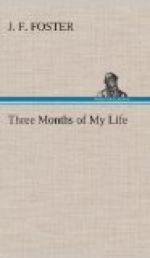July 11th.—Marched on Hultian, distant seventeen miles. Much better road than yesterday, but many ups and downs and short rough bits. Started two hours before sunrise, by the light of the moon. The road soon reached the right bank of the Jhelum and continued the whole distance alongside of that river. It is a rapid river apparently not so deep and often not so wide as the Kishun-gunga, its bed strewn with huge boulders over which the water breaks in great waves of foam. It runs in a narrow rocky channel the precipitous sides of which are a great height. How many ages must it have taken to cut this channel in the solid rock? The valley is bounded by high hills, very narrow, the road so bare of trees, that the latter half of the march became hot and wearying, so I had recourse to the dandy for four or five miles. But it was rare gymnastic exercise as swinging from my pole I had to dodge the great stones on either side of me and keep a sharp look out to avoid hard bumps. My dog was again very much fatigued. His tail is a good token of his state, for when fresh it is stiff along his back, and gradually drops as he goes along until he is quite exhausted, when it hangs straight down. Stopped at a Barahduree (not so good a one as the last) a few feet above the Jhelum in which I bathed. There is a rope bridge opposite, a much older one than the other I crossed, but not more than half as long, and not high above the water, some of the ropes are broken, and it seems very shaky. However, I must cross it to-morrow and get into the Murree road, which runs parallel to this one, on the other bank, and is on the shady side and much cooler. It has been very hot all day. The reason I could not come the direct road from Murree is because the ferry over the Jhelum lower down, was recently carried away and twenty-six natives drowned. Sir G. Larpent’s (of the 88th) baggage was in the boat, and he lost




